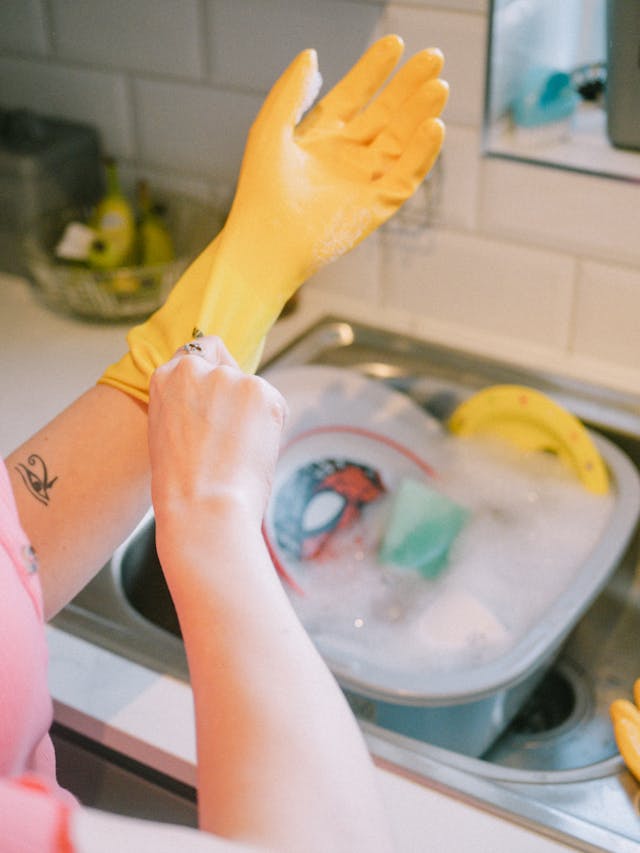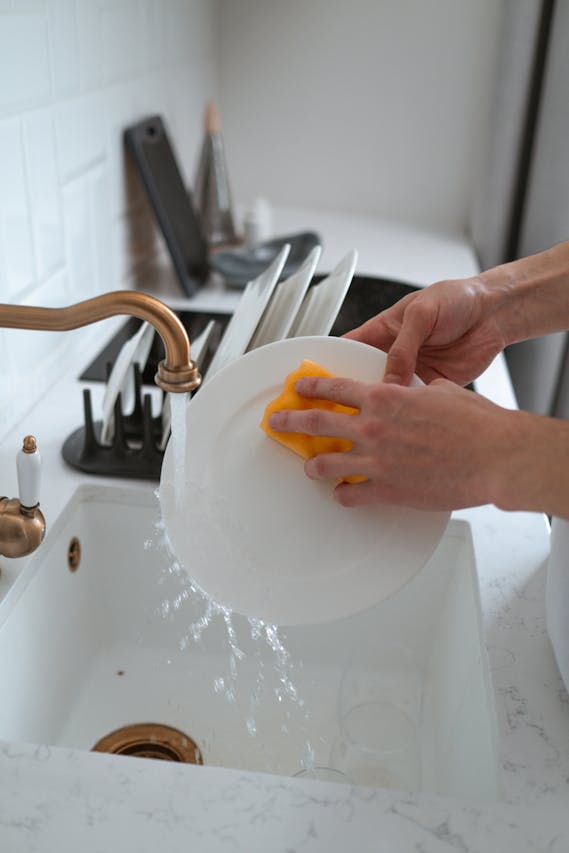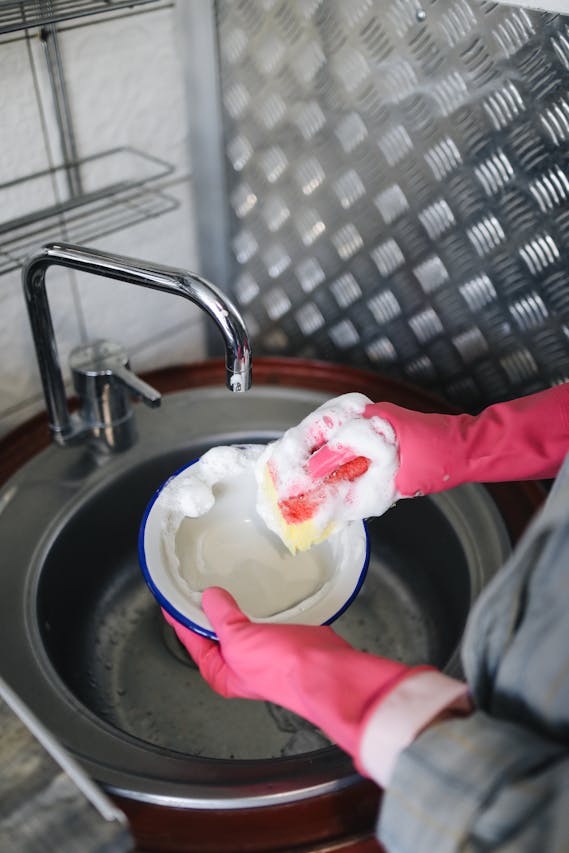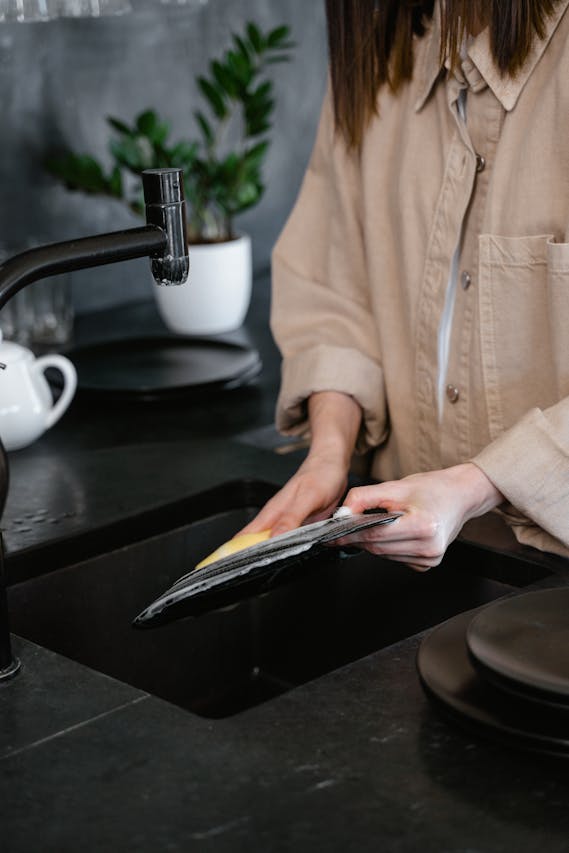Non-toxic dish soap has become increasingly popular in recent years as people become more aware of the potential dangers of traditional cleaning products. Many dish soaps on the market contain harsh chemicals that can be harmful to both the environment and human health. Non-toxic dish soap offers a safer and more sustainable alternative.
Understanding what makes a dish soap non-toxic can be confusing. Some products may be labeled as “natural” or “eco-friendly,” but still contain questionable ingredients. Non-toxic dish soap should be free of harmful chemicals such as phosphates, sulfates, and synthetic fragrances. It should also be biodegradable and packaged in environmentally-friendly materials.
Key Takeaways
- Non-toxic dish soap offers a safer and more sustainable alternative to traditional cleaning products.
- To be considered non-toxic, dish soap should be free of harmful chemicals and packaged in environmentally-friendly materials.
- When selecting a non-toxic dish soap, it’s important to read the ingredients list and look for products that are biodegradable.
Understanding Non-Toxic Dish Soap
Defining Non-Toxic
Non-toxic dish soap is a cleaning agent that is free from harmful chemicals and substances that can be hazardous to human health and the environment. These dish soaps are made from natural and safe ingredients that do not pose any risk to the user or the ecosystem.
Chemical Composition of Dish Soaps
Conventional dish soaps contain a variety of chemicals, including surfactants, preservatives, fragrances, and dyes. Surfactants are the main cleaning agents in dish soaps and are responsible for breaking down grease and grime. However, some surfactants can be toxic and harmful to aquatic life and the environment.
Non-toxic dish soaps, on the other hand, are made from natural ingredients such as plant-based surfactants, essential oils, and minerals. These ingredients are biodegradable and do not cause harm to the environment.
Health and Environmental Impact
Using non-toxic dish soap is not only good for the environment but also for human health. Conventional dish soaps can contain harmful chemicals that can cause skin irritation, respiratory problems, and other health issues. Moreover, these chemicals can also contaminate water sources and harm aquatic life.
Non-toxic dish soaps are gentle on the skin and do not contain any harmful chemicals. They are also safe for septic systems and do not contribute to water pollution.
In conclusion, using non-toxic dish soap is a safer and more eco-friendly alternative to conventional dish soaps. By choosing non-toxic dish soaps, consumers can protect their health and the environment while still achieving clean and sparkling dishes.
Ingredients Analysis
Common Toxins in Dish Soaps
Many dish soaps contain harmful ingredients that can be toxic to humans and the environment. Two common ingredients found in dish soaps are Sodium Lauryl Sulfate (SLS) and Sodium Laureth Sulfate (SLES). These ingredients are known to cause skin irritation and can be harmful if ingested. Fragrances and dyes are also commonly added to dish soaps, but they can cause allergic reactions and skin irritation.
Safe Alternatives to Harmful Ingredients
Fortunately, there are safe alternatives to the harmful ingredients found in many dish soaps. Essential oils such as lemon, lavender, and peppermint can be used to add fragrance without causing skin irritation. Preservatives such as citric acid and grapefruit seed extract can be used to extend the shelf life of dish soaps without the use of harmful chemicals.
Role of Surfactants and Preservatives
Surfactants and preservatives are important ingredients in dish soaps. Surfactants help to break down grease and grime, making it easier to wash dishes. However, not all surfactants are created equal. Look for dish soaps that use plant-based surfactants such as coconut oil or cornstarch instead of SLS or SLES.
Preservatives are necessary to prevent the growth of bacteria and mold in dish soaps. However, some preservatives such as formaldehyde and parabens are harmful to human health. Look for dish soaps that use natural preservatives such as citric acid or grapefruit seed extract.
Overall, it is important to choose a non-toxic dish soap that is safe for both humans and the environment. By avoiding harmful ingredients and choosing safe alternatives, you can ensure that your dishes are clean without compromising your health.
Benefits of Non-Toxic Dish Soap
Non-toxic dish soap is a safer and healthier alternative to traditional dish soaps that contain harmful chemicals. In addition to being safe for human health, non-toxic dish soap also has several environmental advantages.
Health Benefits
One of the primary benefits of using non-toxic dish soap is that it is safe for human health. Traditional dish soaps often contain chemicals such as triclosan, phthalates, and parabens, which can be harmful to human health. These chemicals have been linked to various health problems such as allergies, respiratory issues, and even cancer. Non-toxic dish soaps, on the other hand, are made from natural and safe ingredients, making them a healthier option for people who are concerned about their health.
Environmental Advantages
Non-toxic dish soap is also better for the environment. Traditional dish soaps often contain chemicals that are harmful to the environment. When these chemicals are washed down the drain, they can pollute waterways and harm aquatic life. Non-toxic dish soaps, on the other hand, are made from biodegradable and eco-friendly ingredients, which means that they break down naturally and do not harm the environment.
Using non-toxic dish soap is a simple yet effective way to protect both human health and the environment. By choosing non-toxic dish soap, consumers can ensure that they are using a product that is safe, non-toxic, and eco-friendly.
Selecting the Right Dish Soap
When it comes to selecting the right dish soap, there are a few factors to consider. Evaluating ingredients and labels, certifications and standards, and considering skin sensitivities are all important aspects to keep in mind.
Evaluating Ingredients and Labels
It’s important to read the ingredient label on the dish soap to ensure that it doesn’t contain any harmful chemicals. Look for dish soaps that are free from parabens, phthalates, and synthetic fragrances. Natural ingredients such as plant-based surfactants, essential oils, and citric acid are all great alternatives.
Furthermore, it’s important to note that not all ingredients are created equal. For example, while sodium lauryl sulfate (SLS) is a common ingredient in dish soaps, it can be harsh and drying on the skin. On the other hand, sodium lauryl sulfoacetate (SLSA) is a gentler alternative that still effectively cleans dishes.
Certifications and Standards
Another way to ensure that the dish soap is non-toxic is to look for certifications and standards. The Environmental Working Group (EWG) is a great resource that rates products based on their safety and environmental impact. Dish soaps that have received an EWG verified or certified seal are a good choice.
Other certifications to look for include the USDA Organic or the Leaping Bunny certification, which indicate that the product is cruelty-free and doesn’t contain harmful chemicals.
Considering Skin Sensitivities
For individuals with sensitive skin, it’s important to select a dish soap that is gentle and non-irritating. Dish soaps that are free from harsh chemicals and fragrances are a good choice. Additionally, some dish soaps are specifically formulated for sensitive skin and are labeled as such.
It’s also important to note that allergic reactions can occur from any ingredient, even those that are considered safe. If you experience any adverse reactions, discontinue use immediately and consult with a healthcare professional.
By taking these factors into consideration, selecting a non-toxic dish soap that is safe for both you and the environment can be a breeze.
Product Recommendations
Top Non-Toxic Dish Soap Brands
When it comes to non-toxic dish soap, there are a few brands that stand out from the rest. Ecos, Method, Seventh Generation, Dr. Bronner’s, Blueland, Better Life, and Ecover Zero are all great options to consider. These brands are known for using natural, plant-based ingredients that are gentle on both your skin and the environment.
Ecos is a popular choice for those who want a non-toxic dish soap that is also effective at cutting through grease and grime. Method and Seventh Generation are both widely available and offer a variety of scents and formulas to choose from. Dr. Bronner’s is another great option, especially for those who prefer unscented products. Blueland and Better Life are both newer brands that are gaining popularity for their eco-friendly packaging and commitment to sustainability. Ecover Zero is a great choice for those with sensitive skin, as it is free from fragrances and dyes.
Budget-Friendly Options
If you’re looking for a non-toxic dish soap that won’t break the bank, there are plenty of options to choose from. Ecos, Method, and Seventh Generation all offer affordable options that are widely available at most grocery stores. Better Life and Ecover Zero are also reasonably priced and offer good value for the money.
Specialized Dish Soaps
In addition to traditional dish soaps, there are also specialized options available for those with specific needs. For example, Better Life offers a dish soap specifically designed for baby bottles and other items that come into contact with infants. Ecos also offers a dish soap designed for use in automatic dishwashers.
Overall, there are plenty of non-toxic dish soap options available that are both effective and environmentally friendly. By choosing a brand that uses natural, plant-based ingredients, you can feel good about the products you’re using in your home.
Usage Tips for Non-Toxic Dish Soap
When it comes to washing dishes, using non-toxic dish soap is a great way to keep your family safe from harmful chemicals. However, it’s important to know how to use it effectively to get the best results. Here are some usage tips for non-toxic dish soap.
Effective Cleaning Techniques
Non-toxic dish soap can be just as effective as traditional dish soap if you use the right cleaning techniques. First, make sure to scrape off any excess food or grease before washing. This will help prevent clogging in your dishwasher or sink. Next, use hot water to activate the soap and create a lather. Scrub the dishes with a sponge or brush, focusing on tough areas like baked-on food or grease. Finally, rinse the dishes with hot water to remove any soap residue.
Maximizing Soap Efficiency
To get the most out of your non-toxic dish soap, there are a few things you can do to maximize its efficiency. First, use the recommended amount of soap for each load. Using too much soap can create excess suds that can be difficult to rinse off. Second, consider using a dish soap bar instead of liquid dish soap. Dish soap bars can last longer and be more cost-effective in the long run. Finally, if you’re using a dishwasher, consider using a rinse aid to help prevent spots and streaks on your dishes.
By following these usage tips for non-toxic dish soap, you can keep your dishes clean and your family safe from harmful chemicals.
Sustainability and Packaging
When it comes to non-toxic dish soap, sustainability and eco-friendliness are key factors to consider. One important aspect of sustainability is the packaging of the product.
Eco-Friendly Packaging Options
Many non-toxic dish soap brands offer eco-friendly packaging options. These can include biodegradable or compostable materials, such as paper or cardboard, that are made from renewable resources. Some brands also use recycled plastic for their packaging, which reduces the amount of new plastic being produced.
Another option is to choose dish soap that comes in a reusable container. Some brands offer refillable containers, which can be refilled with soap concentrate or purchased in bulk. This reduces the amount of packaging waste and can save consumers money in the long run.
Refill Stations and Bulk Purchases
Refill stations and bulk purchases are becoming increasingly popular options for sustainable shopping. Some grocery stores and co-ops offer refill stations where customers can bring their own containers and refill them with non-toxic dish soap. This reduces the amount of packaging waste and encourages reuse.
Buying in bulk is another option for reducing packaging waste. Some non-toxic dish soap brands offer bulk purchases, where customers can buy larger quantities of soap concentrate or refillable containers. This can be a cost-effective option and reduces the amount of packaging waste.
Overall, choosing non-toxic dish soap with sustainable and eco-friendly packaging options can have a positive impact on the environment. By reducing packaging waste and encouraging reuse, consumers can make a difference in creating a more sustainable future.
Frequently Asked Questions
What are the top-rated non-toxic dish soap brands?
There are several non-toxic dish soap brands available in the market. Some of the top-rated brands include Seventh Generation, Ecover, Mrs. Meyer’s, and Puracy. These brands are known for their natural ingredients and effectiveness in cleaning dishes without the use of harmful chemicals.
How can I make my own non-toxic dish soap at home?
Making your own non-toxic dish soap at home is easy and affordable. You can use simple ingredients such as castile soap, baking soda, and essential oils to create a natural and effective dish soap. There are many recipes available online that you can try.
What is the safest dish soap to use for washing baby bottles and dishes?
When it comes to washing baby bottles and dishes, it is important to choose a dish soap that is gentle and free from harmful chemicals. Some of the safest dish soaps for washing baby bottles and dishes include Babyganics, Dapple, and Attitude. These brands are specifically formulated for babies and are free from harsh chemicals.
Where is the best place to purchase non-toxic dish soap?
Non-toxic dish soap can be purchased at many natural health food stores, online retailers, and even some grocery stores. Some of the popular online retailers that offer non-toxic dish soap include Amazon, Thrive Market, and iHerb.
Are there any non-toxic dish soap options recommended by the Environmental Working Group (EWG)?
Yes, the Environmental Working Group (EWG) recommends several non-toxic dish soap options. Some of the top-rated brands include Seventh Generation, Ecover, and Mrs. Meyer’s. These brands have received high ratings from the EWG for their natural ingredients and effectiveness in cleaning dishes.
What are some effective alternatives to traditional dish soaps that contain harsh chemicals?
There are several effective alternatives to traditional dish soaps that contain harsh chemicals. Some of the popular alternatives include using baking soda and vinegar, using a natural soap bar, or using a dish soap made from natural ingredients such as castile soap. These alternatives are not only effective but also safe for the environment and your health.















Comments are closed.